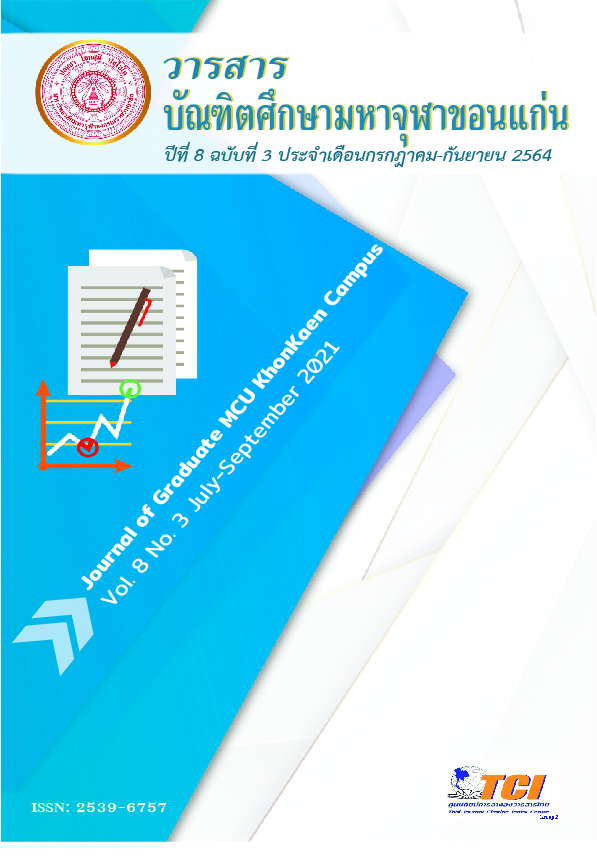ความยุติธรรมของระยะเวลาการออกคำสั่งทางปกครอง ตามมโนทัศน์ของ จอห์น รอลส์
Main Article Content
บทคัดย่อ
การวิจัยนี้มีวัตถุประสงค์เพื่อ 1) ศึกษาแนวคิดความยุติธรรมของระยะเวลาการออกคำสั่งทางปกครอง 2) ศึกษามโนทัศน์ความยุติธรรมของ จอห์น รอลส์ และ 3) วิเคราะห์ความยุติธรรมของระยะเวลาการออกคำสั่งทางปกครองตามมโนทัศน์ของ จอห์น รอลส์ ในพระราชบัญญัติวิธีปฏิบัติราชการทางปกครอง พ.ศ. 2539 มาตรา 39/1 งานวิจัยนี้เป็นการวิจัยเชิงเอกสารใช้วิธีวิเคราะห์เชิงพรรณนา
ผลการวิจัยพบว่า
1) แนวคิดความยุติธรรมของระยะเวลาการออกคำสั่งทางปกครอง คือ การกำหนดมาตรฐานขั้นต่ำให้เจ้าหน้าที่ฝ่ายปกครองออกคำสั่งเป็นหนังสือให้เสร็จภายใน 30 วันนับแต่วันที่เจ้าหน้าที่ได้รับคำขอ และเอกสารถูกต้องครบถ้วน เพื่อให้เกิดความยุติธรรมแก่ประชาชน และบังคับใช้กฎหมายได้อย่างมีประสิทธิภาพ
2) มโนทัศน์ความยุติธรรมของจอห์น รอลส์ ได้รับอิทธิพลมาจาก 3 กลุ่ม คือ สัญญาประชาคม เสรีนิยม และประโยชน์นิยม โดยรอลส์ให้ความสำคัญเรื่องเสรีภาพและความเสมอภาค รอลส์ไม่ยอมรับการให้เหตุผลแบบธรรมชาตินิยม ความเสมอภาคจะเกิดขึ้นต่อเมื่อเพื่อช่วยเหลือปัจเจกชนที่เสียเปรียบ
3) ความยุติธรรมของระยะเวลาการออกคำสั่งทางปกครองตามมโนทัศน์ของจอห์น รอลส์
ในพระราชบัญญัติวิธีปฏิบัติราชการทางปกครอง พ.ศ. 2539 มาตรา 39/1 มีปัญหากรณีเจ้าหน้าที่ไม่ได้ออกคำสั่งภายในเวลา 30 วันนับแต่วันที่เจ้าหน้าที่ได้รับคำขอและเอกสารถูกต้องครบถ้วนก็ไม่ทำให้เป็นคำสั่งที่ไม่ชอบด้วยกฎหมาย และมาตรการบังคับให้เจ้าหน้าที่ออกคำสั่งภายในเวลา 30 วัน เป็นอำนาจบังคับบัญชามิใช่มาตรการบังคับทางกฎหมาย ทำให้เจ้าหน้าที่ละเลยขั้นตอนกฎหมายเกิดความล่าช้า
ไม่ถือว่าปัจเจกชนยอมรับอย่างเสรีภาพ ทางแก้ต้องบัญญัติโทษทางวินัยไว้อย่างชัดเจน และเมื่อพ้น
ระยะเวลาที่กฎหมายกำหนดให้ถือว่าเป็นการออกคำสั่งโดยปริยาย เพื่อคุ้มครองเสรีภาพและความเสมอภาคผดุงไว้ซึ่งสถานะความเป็นกฎหมายกลาง
Article Details
เอกสารอ้างอิง
เกษดา ทองเทพไพโรจน์ . (2553). การวิเคราะห์เปรียบเทียบมโนทัศน์เรื่องความยุติธรรมของ จอห์น รอลส์ กับพระพุทธศาสนา. กรุงเทพมหานคร : มหาวิทยาลัยธรรมศาสตร์.
ชัยวัฒน์ วงศ์วัฒนศานต์. (2540). กฎหมายวิธีปฏิบัติราชการทางปกครอง. กรุงเทพมหานคร: จิรรัชการพิมพ์.
ประดิษฐ์ธรรมนูญ. (2543). คำอธิบายกฎหมายปกครอง. กรุงเทพมหานคร: สภาทนายความ.
ปิยฤดี ไชยพร. (2556). ข้อความคิดว่าด้วยความยุติธรรมทางสิ่งแวดล้อมที่เป็นฐานคิดด้านสิทธิชุมชน. ใน วิทยานิพนธ์อักษรศาสตรดุษฎีบัณฑิต. บัณฑิตวิทยาลัย: จุฬาลงกรณ์มหาวิทยาลัย.
พระราชบัญญัติวิธีปฏิบัติราชการทางปกครอง (ฉบับที่ 2) พ.ศ. 2557. แก้ไขโดยมาตรา 39/1 ราชกิจจานุเบกษา. เล่ม 131 ตอนที่ 89 ก, 30 ธันวาคม 2557.
พระราชบัญญัติวิธีปฏิบัติราชการทางปกครอง พ.ศ. 2539, มาตรา 3. ราชกิจจานุเบกษา. เล่มที่ 132 ตอนที่ 60, 14 พฤศจิกายน 2539.
รัฐธรรมนูญแห่งราชอาณาจักรไทย พุทธศักราช 2560, มาตรา 50(3). ราชกิจจานุเบกษา. เล่มที่ 134 ตอนที่ 40 ก, 6 เมษายน 2560.
วรเจตน์ ภาคีรัตน์. (2554). กฎหมายวิธีปฏิบัติราชการทางปกครองสำหรับองค์การปกครองส่วน. กรุงเทพมหานคร: สถาบันพระปกเกล้า.
วิษณุ เครืองาม. (2530). กฎหมายรัฐธรรมนูญ. กรุงเทพมหานคร: นิติบรรณาการ.
ศุภชัย ศุภผล. (2558). จอห์น รอลส์ : ว่าด้วยทฤษฎีความยุติธรรมและชีวิตของจอห์น รอลส์. กรุงเทพมหานคร: วิคตอรี่.
สมเกียรติ วันทะนะ. (2551). อุดมการณ์ทางการเมืองร่วมสมัย. (พิมพ์ครั้งที่ 2). กรุงเทพมหานคร: เอส พี วี การพิมพ์ มูลนิธิฟรีดริค เอแบร์ท.
สมยศ เชื้อไทย. (2554). หลักกฎหมายมหาชนเบื้องต้น. กรุงเทพมหานคร: วิญญูชน.
สุชาย อัศวพันธุ์ธนกุล. (2533). ความคิดเรื่องความเท่าเทียมกันในทฤษฎีความยุติธรรมของ จอห์น รอลส์. ใน วิทยานิพนธ์อักษรศาสตรมหาบัณฑิต. บัณฑิตวิทยาลัย: จุฬาลงกรณ์มหาวิทยาลัย.
สุริยา ปานแป้น และอนุวัฒน์ บุญนันท์. (2556). คู่มือสอบกฎหมายปกครอง. กรุงเทพมหานคร: วิญญูชน.
หยุด แสงอุทัย. (2538). หลักรัฐธรรมนูญทั่วไป. กรุงเทพมหานคร: วิญญูชน.
อภิวัฒน์ จิตวิสัย. (2562). ปัญหากฎหมายเกี่ยวกับระยะเวลาในการออกคำสั่งทางปกครองตามพระราชบัญญัติวิธีปฏิบัติราชการทางปกครอง พ.ศ. 2539. วารสารวิจัยและพัฒนา มหาวิทยาลัยราชภัฏเลย, 14(48), 8-19.

